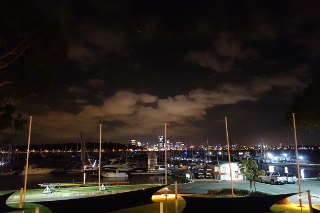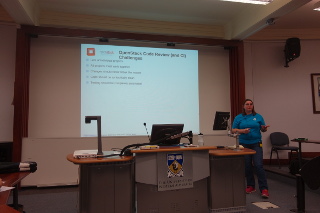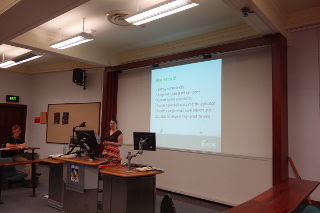After all of the OpenStack stuff I discussed in my last post, I presented two more times at linux.conf.au, on Tuesday and Wednesday.
Tuesday morning the keynote by Kate Chapman on the Humanitarian OpenStreetMap Team (HOT). I haven’t paid a lot of attention to OpenStreetMap over the years because there are only so many hours in a day, but it was very interesting to learn that the work they’re doing to map developing countries is really making a difference for disaster relief, urban development and more for regions in need. I can’t make time to participate in their program right now, but you should! A copy of her talk is already available on Tuesday’s mirror of talks.
My second talk of the conference came in the form of a Haecksen talk on Tuesday. It was really exciting to have my talk accepted and it was one I was particularly looking forward to it, where I was talking about myths of public speaking. There were several revolutionary points in my learning to do speaking, so I tried to summarize them into a 20 minute presentation, slides here. My main points were:
- Myth: The audience won’t like you
- Myth: You have to know everything
- Myth: Good speakers don’t need to practice
- Myth: Good speakers don’t get nervous
- Myth: Shy people make poor speakers
- Myth: Your talk must be completely original
- Myth: I can’t because <insert any excuse here>
I also really enjoyed the Q&A during this session, so thanks to everyone who attended and participated with questions and helpful responses to the comments from others. In Haecksen I also learned about Robogals and it was great to hear a talk about giving talks by Alice Boxhall, who I saw speak at OSCON last year on automated testing for accessibility. I was in such great company!
On Tuesday night I attended the speakers dinner and sat between two spouses who I got to talk to about their tag-along status at the conference. Dinner was enjoyable, if a bit slow, and the view from the venue was really nice:
Wednesday morning my final (and primary, not miniconf) talk was first up at 10:40, on Systems Administration in the Open. This is a modified version of my Code Review for Systems Administrators talk where I instead focused on the benefits of projects and organizations open sourcing their operations – or at least making it more available to others in their organization to submit changes to. Working on the OpenStack Infrastructure team continues to be a great experience for me, and it’s funny how I’m feeling about how other projects manage their infrastructure now that I’m so used to how we do it. Submit a ticket to fix something and wait? Can’t I pitch in? I do see more open source projects moving to a more open model, but I’d like to see more. My slides are here.
And then my talks were done! I could relax and enjoy the rest of the conference.
One of the highlights of the day was a talk on The changing Linux kernel development process by Jonathan Corbet. It was particularly interesting to see a general view of how the ecosystem has changed in relation to folks working on core Linux kernel components vs the mobile-specific changes that support so many new devices today. It was also noteworthy to see that the companies working on the core are largely static, whereas many of the newer commits in new kernels are coming from the mobile-specific vendors.
Karen Sandler did a great talk on the Outreach Program for Women. I’ve heard bits and pieces about this program and have met several participants (one of whom now works with me!) but I hadn’t seen the statistics and successes that Karen shared in this talk. The increase in applications from women in the Google Summer of Code went from 1 to 7 in some projects following the launch of the GNOME program, and this was not an outlier. What this really drove home for me was that there are women out there who are interested in open source and participating, but there are still perception barriers preventing many from applying themselves to a project (“it’s not for me” “I am not good enough”). There were also other things the program does, which she outlined:
- Offer internships for non-students and non-coders
- Connect applicants with pool of mentors
- Require a contribution as part of the application
- Provide small, manageable tasks throughout the internship rather than one big project
- Require participants to blog regularly about their work and join project planets if possible
- Sponsored travel when possible to collaborate with project members in person (conference, summit, sprint, etc)
I’m excited to see such a program be so successful, and look forward to seeing the number of women in our communities continue to rise as a result.
And a highlights post wouldn’t be complete without mentioning Marc MERLIN’s Live upgrading many thousands of servers from an ancient RedHat 7.1 to a 10 year newer Debian. It was as crazy as it sounds, and was super interesting to listen to. More about the talk, including detailed slides here (a link to the paper for a more thorough read is also in that directory).
Tomorrow is the last day of the conference and I’m looking forward to seeing talks by several of my colleagues, Clark Boylan on Processing Continuous Integration Log Events, James Blair talking about Zuul, Robert Collins doing a deep dive into Diskimage-builder and Devananda van der Veen on Provisioning Bare Metal with OpenStack.




